FROM May 6th, 2019
Toyin Saraki and the Wellbeing Foundation Africa, of which she is the Founder-President, today held a multi-lateral event with key stakeholders to mark the International Day of the Midwife. The conference, held jointly with the ACT Foundation and Access Bank, was attended by representatives of the National Association of Nigerian Nurses and Midwives; the Ministry of Health, FHI360, the Luth School of Midwifery, and other strategic partners in the space of global health.
Thanking partners for their advocacy and engagement, Toyin Saraki went on to deliver her keynote speech, commenting:
“We are joined here today with a common vision and passion, and I am sincerely heartened by your presence and ongoing enterprise.”
“I stand before you today as the Global Goodwill Ambassador for the International Confederation of Midwives, commonly known as ‘ICM’, which represents 500,000 midwives, in 132 associations across 113 countries. Within that huge scope there are of course significant differences in the environments and conditions in which midwives operate. Wherever they work, however, midwives are the community leaders and interlocutors who are best placed to foster safe environments including, but also beyond, pregnancy, birth and breastfeeding”.
“As allies of midwives, it is incumbent upon us to advocate for the whole-system support to enable and elevate midwives as the key defenders of women’s rights – in Nigeria and around the world. Today I would like to alight on the critical elements of that whole-system support, with a particular focus on the role of women’s rights in light of the theme of this year’s International Day of the Midwife. I will also explain why I do not believe it is a coincidence that it is a day shared with ‘World Hand Hygiene Day,’ as water, sanitation and hygiene, or ‘WASH,’ is a critical factor in systemic progress for and with midwives.”
“Midwives are champions of women’s rights; but can only be effective if their rights are also secure. This includes the right for every midwife—and all health workers—to decent work and a safe and dignified workplace. Saving lives does not mean a midwife should risk her own. Sadly, as we all know, in the past year we have lost selfless Nigerian midwives. Too often midwives also suffer ‘burnout’ – from long hours carrying out a complex role, combined with the lack of basic infrastructure or professional support to deliver high-quality care. Many rural midwives represent the sole point of access to health care in remote and under-served areas. It is our first duty to keep the care-givers safe.”
“Whole-system support means providing midwives with the adequate tools, equipment, and medicine to provide the full scope of timely, high-quality care, and the capacity to carry out the WHO-recommended 8 antenatal visits. That can only be achieved through effective supply chain management and procurement, overcoming challenges related to drug selection, registration, quantification, procurement, storage and distribution, quality assurance, and information systems.”
“If 13 essential reproductive and maternal health-related commodities were more widely available, it is estimated that the lives of over 6 million women and children could be saved. Those commodities are as follows:
Oxytocin – for post-partum haemorrhage (PPH)
Misoprostol – also for postpartum haemorrhage
Magnesium sulfate – for eclampsia and severe preeclampsia
Injectable antibiotics – to combat newborn sepsis
Antenatal corticosteroids (ANCs) – for preterm respiratory distress syndrome
Chlorhexidine – for newborn cord care
Resuscitation devices
Amoxicillin – for
Oral rehydration salts (ORS) – to treat diarrhoea
Zinc – also for diarrhoea
Female condoms
Contraceptive implants
Emergency contraception – family planning/ contraception”

“Each of these commodities form part of the toolkit with which we need to equip midwives. But they also need to be equipped with a career trajectory and security to benefit them and the communities that they serve. Health system managers, supervisors and policymakers need to better support midwives throughout their careers: from planning, for example for a midwife’s recruitment and deployment to a post, to providing supportive supervision and clinical mentoring and amplifying midwives’ leadership roles.”
“Where midwives’ human resources metrics are not tracked, they cannot be managed. Thus, more data on midwives is needed: from midwifery schools on graduate profiles; from professional associations or councils on licensure, registration, and continuing professional development; and routine, robust, and up-to-date human resource information systems. In addition, midwife-generated data streams can provide valuable feedback on how services are delivered and promote service improvements. A comprehensive civil registration and vital statistics system must form the basis of health services and personnel decision making. That will, I have no doubt, provide the evidence needed to understand how midwives’ enhanced leadership roles can optimize health systems.”
“I recently chaired a technical working group at SwitchPoint Conference in North Carolina, organised by IntraHealth International. Our focus was on gender equality and the workforce. Despite my many years of working with frontline health workers, I was shocked by some of the accounts of gender violence. As an absolute essential element of a functioning, decent and dignified health system, a midwife’s workplace must be free from sexual harassment and gender discrimination. According to a global survey conducted by the International Confederation of Midwives and the WHO, 37% of midwives reported that they have experienced harassment at work, whether from colleagues or patients. Effective interprofessional collaboration is important to keeping midwives’ workplaces safe”.
“The theme of last year’s International Day of the Midwife was “Midwives Lead The Way”, and indeed, safe workplaces also mean safe conditions of water, sanitation and hygiene: WASH. Thus, in 2018 I was delighted when Dr Tedros, Director-General of the World Health Organization, matched World Hand Hygiene Day with International Day of the Midwife. Midwives of course need clean water to facilitate a safe and healthy delivery and support families’ sanitation and hygiene needs across their lives. Everyone here today knows of healthcare facilities where midwives must pull buckets of water up from wells themselves; purchase their own examination gloves; chase livestock out of the health centre compound for lack of a proper fence; or dig makeshift pits to dispose of medical waste”.
“At the Wellbeing Foundation Africa, we launched a water, sanitation and hygiene campaign in May 2018, at the World Health Organization offices, in Abuja. We did so precisely because of the overwhelming evidence coming back to us from our frontline healthcare programmes that we had to retrace our steps – that WASH indices in Nigeria were not only poor; but were worsening in many instances. Poor WASH conditions endanger Infection Prevention and Control systems and put health workers and service users at risk. The fact that outbreaks of diseases have been so severe in Nigeria recently – with the WHO commenting that the Lassa Fever outbreak last year was unprecedented – is no coincidence”.
“Our MamaCare midwives began to advocate in the over 570 healthcare facilities where we work, for better standards and taught proper handwashing techniques to staff. Their experiences informed our updated child and adolescent Personal, Social, Health and Economic (PSHE) education programmes which takes place at schools, teaching staff and students alike the importance of good WASH standards. We already had the framework in place – and the trust of communities – to adapt our programmes to address a significant health risk, thanks to midwives”.
“But in a country of almost 200 million people we knew that we had to reach far beyond that. This is where the key relationship between frontline experience and the ability to improve capacity by achieving effective advocacy comes in”.
“As we launched the campaign in May 2018, we announced that the Foundation would advocate to key development partners and policymakers including World Bank Water, USAID, the State Department of the United States Government, and the United States Congress, allying our human development effort with the Global Water 2020, an initiative based in Washington D.C. which is designed to accelerate progress toward water access and security for all people in developing countries, with a particular focus on increasing the availability of WASH in healthcare facilities and schools, and ending Open Defecation. A key element of that partnership is advocacy for improved WASH standards, both in Nigeria and around the world. As Special Adviser to the WHO Africa Regional Office, I strongly advocate for the WHO Sepsis Resolution to be adopted and implemented by all governments. In October 2018 the WHO introduced new and pioneering guidelines for WASH in conjunction with neglected tropical diseases”.
“In September 2018 the WBFA partnered with Unilever Lifebuoy Nigeria and Sightsavers to improve hygiene practices to impact more than 2 million children over the following 12 months. The partnership works on programmes which promote hygiene messages and prevent disease, advancing critical hygiene interventions such as handwashing with soap, addressing the issues of trachoma and diarrhoea to reduce child illnesses and mortality due to preventable diseases”.
“This program will soon extend to midwives, the health facilities they work in, and the mothers they serve as the first eyes to see, and first hands to hold, our newborns, for clearly, clean hands save lives”.
“In many West African countries, data provided by UNICEF indicates that between 15 to 20% of newborn deaths in their first month of life are due to sepsis. According to the World Health Organization, improved access to WASH and improved handwashing for all health workers could help prevent infections, and the risk of sepsis in health facilities. We know what works for WASH standards: we must provide those standards and training for midwives who once again have led the way to strengthen health policies nationally, as I welcome the announcement this week of a new WASH program by the National Centre for Disease Control, termed “Turn Nigeria Orange” encouraging health workers to wash their hands with soap and water.”
“As we are joined by our partners here today, I must also mention and commend them for our joint work on the Alive and Thrive programme. I am delighted by the nucleus of critical host community support from the Lagos State Government and thank our Alive & Thrive programme partners, FHI360 for their technical support and oversight, the Association of General and Private Medical Practitioners of Nigeria, the Wellbeing Foundation Africa Team and all those involved in the organization of this conference. Thank you for your efforts as Nigeria unites to ‘Start Strong!’ for infant and child nutrition as part of a global movement.”
“Alive & Thrive is an initiative to save lives, prevent illness, and ensure healthy growth and development through the promotion and support of optimal maternal nutrition, breastfeeding and complementary feeding practices in rural and urban Lagos as well as Kaduna. Good nutrition in the first 1,000 days from conception to two years of age is critical to enable all children to lead healthier and more productive lives. Alive & Thrive works through a four-pronged approach: policy and advocacy; interpersonal communication and community mobilization; mass communication; and the strategic use of data. Our midwives are crucial to each part of that approach and I cannot conclude my remarks here today without paying tribute to them for their work on this programme”.
“With the Wellbeing Foundation’s access to the latest global and home-grown midwifery-led research on the benefits of mother’s own milk in neonatal intensive care units for sick and premature infants, I again look forward to bringing these key findings to the frontline of care in Nigeria, through advocating for the administration of buccal colostrum to fragile neonates who need special care, another example of Midwifery leadership enabling and elevating whole health system strengthening, to nurture and nourish the most fragile infants for a stronger start from premature birth, to survive, alive, and thrive, to age.”
“I must also pay a special tribute to our MamaCare midwives. They deliver classes in primary healthcare centres, hospitals, and at IDP camps, which are a peace and security frontline for displaced, vulnerable and traumatised women and their infants. Despite dire mortality rates in Nigeria – where women face around a one in thirteen risk of maternal mortality in their lifetime – we have not lost even one of our over 250,000 MamaCare mothers during childbirth”.
“Our MamaCare midwives have achieved this not only by providing classes to a global standard – orienting health-seeking behavior and improving Nigeria’s progress towards the WHO benchmark recommendation of at least 8 antenatal visits which the Wellbeing Foundation Africa’s Reproductive Health Lifeprint achieves – but also because they act as even more than lifesavers. They provide safe spaces and safe conversations: no subject is taboo or off-limits. They can only do this because they are part of the community that they serve. Too often, global institutions have faced push-back when trying to deliver services – examples that stand out to me include vaccinations and family planning provisions – because they attempt to do so as outsiders, without the trust of a community.”
“Placing midwives at the centre of our work gave us an army of professional community counsellors which has helped to drive the behavioural change to make women an empowered and informed partner. Midwives are the interlocutors between our Foundation, its aims, and women”.
“They should however become the interlocutors between every government and global institution and the communities that they serve.
To achieve this, we must enable and elevate midwives with whole-system support – as ‘Defenders of Women’s Rights.’ Thank you”.

Toyin Saraki is the Founder-President of the Wellbeing Foundation Africa, the Global Goodwill Ambassador for the International Confederation of Midwives, and the Special Advisor to the Independent Advisory Group of the World Health Organization Regional Office for Africa.
FROM May 4th, 2019
This year’s theme for the International Day of the Midwife, commemorated on May 5, is “Midwives: Defenders of Women’s Rights.” This includes the right for every midwife—and all health workers—to decent work and a safe and dignified workplace. Saving lives does not mean a midwife should risk her own. We hear stories of too many midwives burnt out, from not just the long hours guiding families through their complex and unpredictable travails, but from the lack of basic infrastructure or professional support to deliver high-quality care. Behind every miraculous and unique birth, every interaction between a midwife and her clients, the midwife’s “whole system” must be strong and supportive.
Let us support a midwife to reach her fullest potential by supporting her “whole system”:
Access to water, sanitation and hygiene (WASH): Midwives need clean water to facilitate a safe and healthy delivery and support families’ sanitation and hygiene needs across their lives. Whether in Nigeria or Timor-Leste, we have witnessed midwives who must pull buckets of water up from wells themselves; purchase their own examination gloves; chase livestock out of the health center compound for lack of a proper fence; or dig makeshift pits to dispose of medical waste.
In the words of midwife Rita Momoh, “it is not possible for us to do our jobs as midwives without access to water, sanitation, and handwashing stations.”
Progress in reducing neonatal mortality is slower than in mortality among children aged 1–59 months. In many West African countries, data provided by UNICEF indicates that between 15 to 20% of newborn deaths in their first month of life are due to sepsis. According to the World Health Organization, improved access to WASH and improved handwashing for all health workers could help prevent infections, and the risk of sepsis in health facilities.
Adequate tools, equipment, and medicine: All midwives should have the supplies and commodities needed to provide timely, high-quality care. Effective supply chain management and procurement is needed so she can access life-saving medicines. Challenges are related to drug selection, registration, quantification, procurement, storage and distribution, quality assurance, and information systems.
If 13 essential reproductive and maternal health-related commodities were more widely available, it is estimated that the lives of over 6 million women and children could be saved.
A positive and safe social environment: For many rural midwives, they represent the sole point of access to health care in remote and underserved areas. When communities are engaged with midwives to develop a strong and trusting relationship, to provide feedback about their perceptions of the care she delivers, and even to encourage and support her by providing living quarters, clean water, or planting her a vegetable garden, they demonstrate their understanding and appreciation of her contributions.
A midwife’s workplace should also be free from sexual harassment and gender discrimination. According to a global survey conducted by the International Confederation of Midwives and the WHO, 37% of midwives reported that they have experienced harassment at work, whether from colleagues or patients. Effective interprofessional collaboration is also important to keeping midwives’ workplaces safe.

Professional careers guided by data-driven human resources management: Health system managers, supervisors, and policymakers need to better support midwives throughout their careers: from planning (e.g., a midwife’s recruitment and deployment to a post), to providing supportive supervision and clinical mentoring and amplifying midwives’ leadership roles.
Where midwives’ human resources metrics are not tracked, they cannot be managed. Thus, more data on midwives is needed: from midwifery schools on graduate profiles; from professional associations or councils on licensure, registration, and continuing professional development; and routine, robust, and up-to-date human resource information systems. In addition, midwife-generated data streams can provide valuable feedback on how services are delivered and promote service improvements.
Vertical segregation, where female health workers do not advance to higher leadership and remuneration as their male counterparts, remains a challenge within primary health care and health systems. More evidence is needed to understand how midwives’ enhanced leadership role can optimize health systems.
This International Day of the Midwife, let us support midwives’ “whole system” so they can be the change agents that our world needs.
By H.E. Mrs Toyin Saraki / Wellbeing Foundation Africa/ Rachel Deussom / HRH2030 Program, Chemonics International
FROM May 3rd, 2019
Her Excellency Mrs Toyin Ojora Saraki this week chaired a panel on “Accountability and Human Development”, as a Guest of Honour, at the Nigeria Governors Forum Induction Summit for Spouses of Governors and Governors-Elect.
Ahead of International Day of the Midwife, which is marked on 5th May, Mrs Saraki – who is the Global Goodwill Ambassador for the International Confederation of Midwives, representing 500,000 midwives, in 132 associations across 113 countries – highlighted the importance of midwives as defenders of women’s rights.

Mrs Saraki, who drew upon her experience as First Lady of Kwara State from 2003 to 2011, also focused her remarks on reproductive, maternal, newborn, child and adolescent health (RMNCAH), nutrition, Emergency Obstetric and Newborn Care (EmONC), and the water, sanitation and hygiene programs of the Wellbeing Foundation Africa, of which she is the Founder-President.

Mrs Saraki further commented:
“I was delighted this week to chair a panel, “Accountability and Human Development”, as a Guest of Honour, at the Nigeria Governors Forum Induction Summit for Spouses of Governors and Governors-Elect, at the kind invitation of His Excellency Alhaji Abdul-Aziz Yari, Governor of Zamfara State and Chairman, Nigeria Governors Forum, at the Presidential Banquet Hall, Abuja, Nigeria.”
“I was pleased to introduce UN Women, The ONE Campaign, BudgIT, CODE, and the Health Sector Reform Coalition to the Spouses of the Governors and Governors-Elect, in advocating for the principles of Accountability and Human Development, regarding universal health coverage,
the basic health care provision fund, education, gender affirmative policies and child rights, all of which flow from comprehensive civil registrations and vital statistics.”
“I commend the Nigeria Governors Forum for pioneering this laudable initiative”.
“In sharing the evolution and progress of my Wellbeing Foundation Africa’s programs to raise the quality and accessibility of maternal and child health care, nutrition, civil registrations and vital statistics in Nigeria, I also also highlighted the important role of midwives in Nigeria and around the world. Women and girls have the right to live safe from harm, violence, discrimination and abuse. As community leaders and interlocutors, midwives are best placed to foster safe environments including, but also beyond, pregnancy, birth and breastfeeding. In a year when midwives have been killed and threatened for carrying out their duties, I paid tribute to those who we have lost and reiterate our core belief that we need more midwives to provide a quality continuum and care and counsel, and our midwives need safe and enabling environments to work in and the right to provide care across their full scope of practice, with the right training, remuneration and support.”

The Governors Spouses Summit, chaired by Hajia Asmau Yari, wife of the Zamfara State Governor and Chair of Nigeria Governors Forum, was also attended by Guests of Honour, Their Excellencies the Wife of the President, Hajiya Aisha Muhammadu Buhari, Former First Ladies Hajiya Turai Yar-Adua, Professor Mrs Uche Azikiwe, Wife of Former Vice-President Hajiya Amina Namadi Sambo, and Honorable Dorothy McAuliffe, Former First Lady of Virginia State, USA, alongside several global development agencies and partners.
Mrs Saraki is also Special Adviser to the Independent Advisory Group to the World Health Organization Regional Office for Africa and was named by Devex as a global ‘Health for All Champion.’ The Wellbeing Foundation Africa is a member of the Economic and Social Council (ECOSOC) of the United Nations.
FROM April 30th, 2019
Ahead of the United Nations High-Level Meeting on Universal Health Coverage in New York on Monday, Toyin Saraki, Founder-President of the Wellbeing Foundation Africa, co-chaired a technical session on women’s rights and equality in global health in North Carolina, bringing together leading experts from the sector.
The session was led by Mrs Saraki at SwitchPoint 2019, the annual gathering of global humanitarian experts hosted by IntraHealth International, alongside Pape Gaye, President and Chief Executive Officer of IntraHealth International; Constance Newman, Senior Team Leader, Gender Equality and Health at IntraHealth International; and moderated by Stembile Mugore, Senior advisor for health sector performance and sustainability at IntraHealth International.
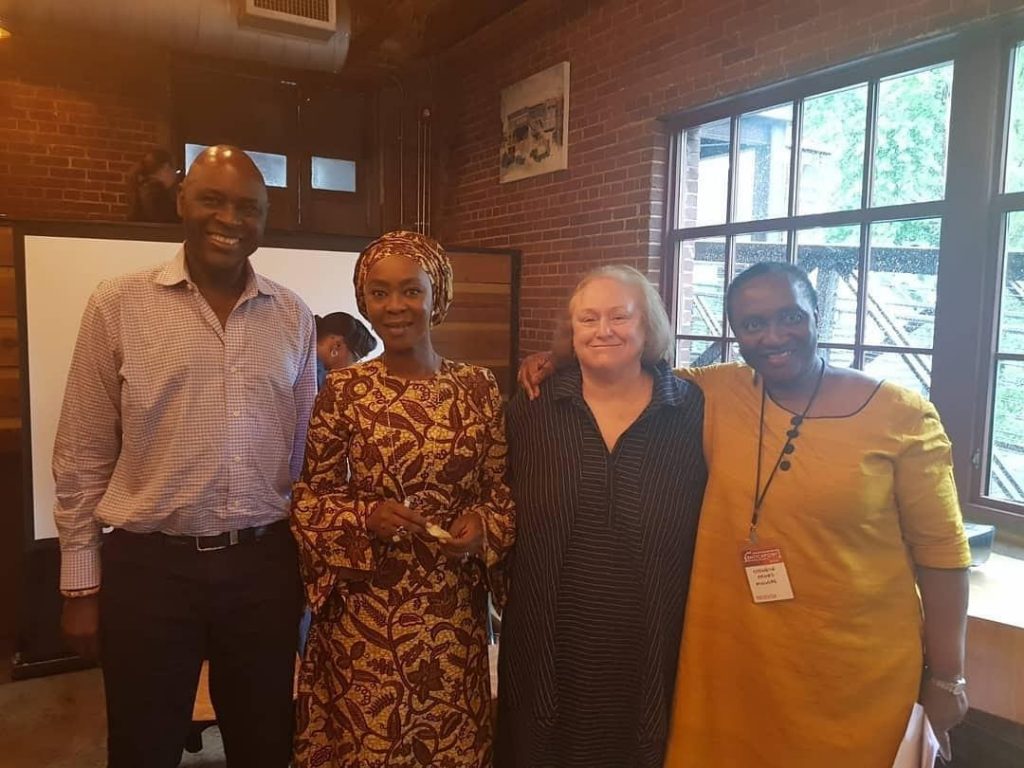
Mrs Saraki expressed her hope that the technical session would lead to a step-change in the push for equality in the global health sector at large, from leadership positions to the frontline healthcare workforce, stating that:
“Women make up 70% of the health and social-sector workforce, yet half of women’s contributions to global health are unpaid. Women are also under-represented in global health leadership, taking on only 25% of senior positions.”
“We have identified Global Health 50/50 reports which demonstrate that organizations from the United Nations system; bilateral and multilateral development institutions; philanthropic organizations and funders; civil society and nongovernmental organizations; public-private partnerships; and the private sector still have a long way to go to reflect the values they are trying to themselves instil. I do however salute our male allies – for instance, when the Director-General of the World Health Organization, Dr Tedros Adhanom Ghebreyesus, became the first African to succeed to that role, he established a senior leadership team which consists of more than 60% women.”
“Dr Tedros is also correct to point out that it is often health workers who are the first responders to violence and deal with its consequences, and that investments in creating jobs for health workers are also investments in gender equality.”
“IntraHealth International has also led the way in its deliberate affirmation of female leadership: where such organizations have been trailblazers, it is now incumbent upon nation states to follow suit as part of national and global health priorities.”
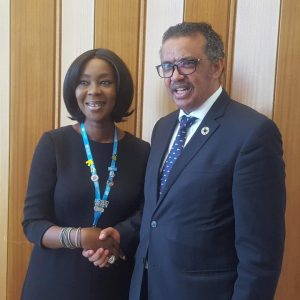
Commenting ahead of the United Nations Multi-Stakeholder Hearings on Universal Health Coverage holding in New York, Mrs Saraki added:
“Community healthcare workers are at the front line of key interventions, including immunization and in the fight against measles, but we have identified research which shows how they are often systematically taken advantage of in the most distressing of ways. This has to change.”
“The challenges faced by midwives who lead the community care continuum are no different to the barriers restraining women from global health leadership. In the World Health Organization’s 2016 report ‘Midwives’ Voices Midwives Realities,’ which documented the voices and experiences of 2,470 midwifery personnel who provide care to childbearing women and their newborns in 93 countries, it was pointed out that midwifery plays a “vital” role, and when provided by educated, trained, regulated, licensed midwives, is associated with “improved quality of care and rapid and sustained reductions in maternal and newborn mortality.”
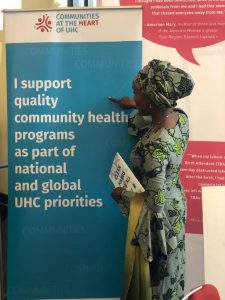
The report also highlights however “that it is not just about fixing financial resources or health systems, but about redressing complex hierarchies of power and transforming gender dynamics. Respondents highlighted that “power, agency and status” is important for midwifery personnel if progress is to be made in delivering quality care.”
“We must achieve proper leadership representation for women in the global health space throughout Africa and the world – but also in every legislature, and at the very highest level of politics, business and civil society. We can commend our male allies whilst appreciating the need for women to lead the way for women ourselves.”
“The Wellbeing Foundation Africa, as a member of the United Nations Economic and Social Council (ECOSOC) and the UN Global Compact, is commited to achieving universal health coverage through a model focused on primary healthcare model – along with the right training and support for healthcare workers, a comprehensive accountability structure, and safe water, sanitation and hygiene conditions.”
Mrs Saraki is also Special Advisor to the Independent Advisory Group to the World Health Organization Regional Office for Africa and the Global Goodwill Ambassador to the International Confederation of Midwives.
FROM April 27th, 2019
Toyin Ojora Saraki this week delivered the keynote speech to SwitchPoint 2019 Conference in North Carolina. SwitchPoint is an annual meeting of hundreds of attendees from around the world, including non-profit and development professionals, corporate experts, educators, policy makers, innovators and social entrepreneurs.
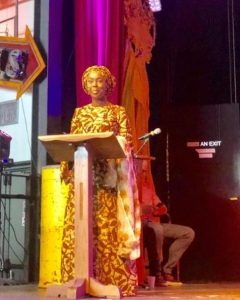
The Founder-President of the Wellbeing Foundation Africa delivered the keynote on the theme of ‘Every Woman, Every Child, Every Hour.’ It was described by Heather LaGarde, Producer of SwitchPoint 2019 as “a stunningly powerful keynote” which moved her to tears.
Toyin Ojora Saraki this week delivered the keynote speech to SwitchPoint 2019 Conference in North Carolina. SwitchPoint is an annual meeting of hundreds of attendees from around the world, including non-profit and development professionals, corporate experts, educators, policy makers, innovators and social entrepreneurs.
The Founder-President of the Wellbeing Foundation Africa delivered the keynote on the theme of ‘Every Woman, Every Child, Every Hour.’ It was described by Heather LaGarde, Producer of SwitchPoint 2019 as “a stunningly powerful keynote” which moved her to tears.
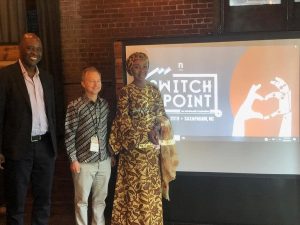
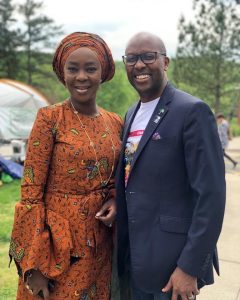
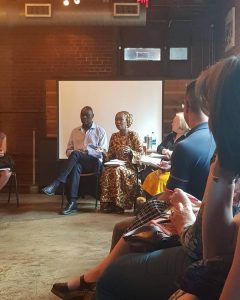
Mrs Saraki also co-chaired a ‘Micro-lab’ focus session on the topic of ‘Women First’ with Pape Gaye, President and Chief Executive Officer of IntraHealth International; Constance Newman, Senior Team Leader, Gender Equality and Health at IntraHealth International; and Stembile Mugore, Senior advisor for health sector performance and sustainability at IntraHealth International.
Mrs Saraki is also Special Advisor to the Independent Advisory Group to the World Health Organization Regional Office for Africa and the Global Goodwill Ambassador to the International Confederation of Midwives.
FROM April 25th, 2019
Major US Conference set to tackle Global Health, Impacts of Misinformation, Immersive Technology and Innovation
Founder-President of the Wellbeing Foundation Africa, Toyin Ojora Saraki, is set to deliver the keynote address to the SwitchPoint2019 Conference in North Carolina this week, as global humanitarian experts gather for the annual sessions hosted by IntraHealth International.
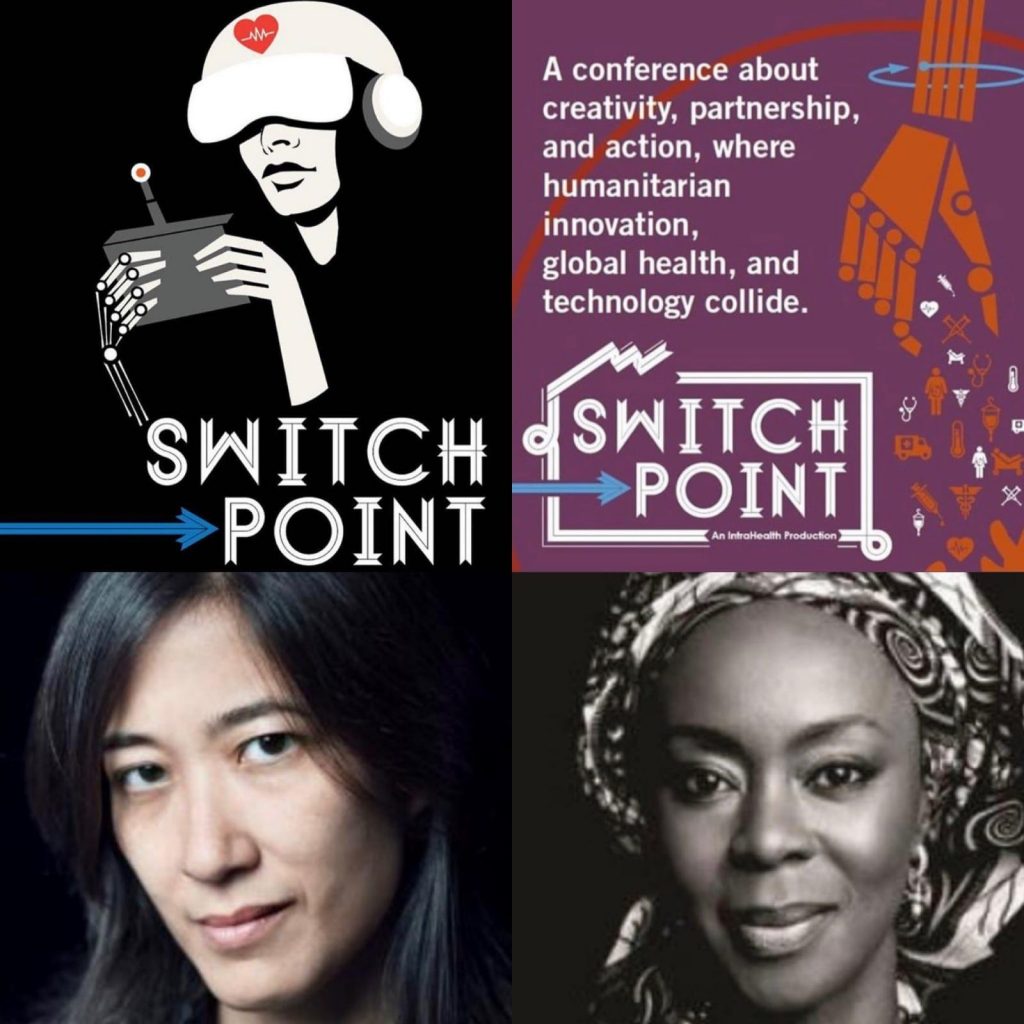
Each year SwitchPoint draws hundreds of attendees from around the world, including non-profit and development professionals, corporate experts, educators, policy makers, innovators and social entrepreneurs.
Mrs Saraki is expected to address key aspects of the health workforce, maternal and child health, and gender equity, drawing upon her experience leading a Foundation at the frontline of healthcare solutions, in addition to her advisory role to the Independent Advisory Group to the World Health Organization Regional Office for Africa and as the Global Goodwill Ambassador to the International Confederation of Midwives.
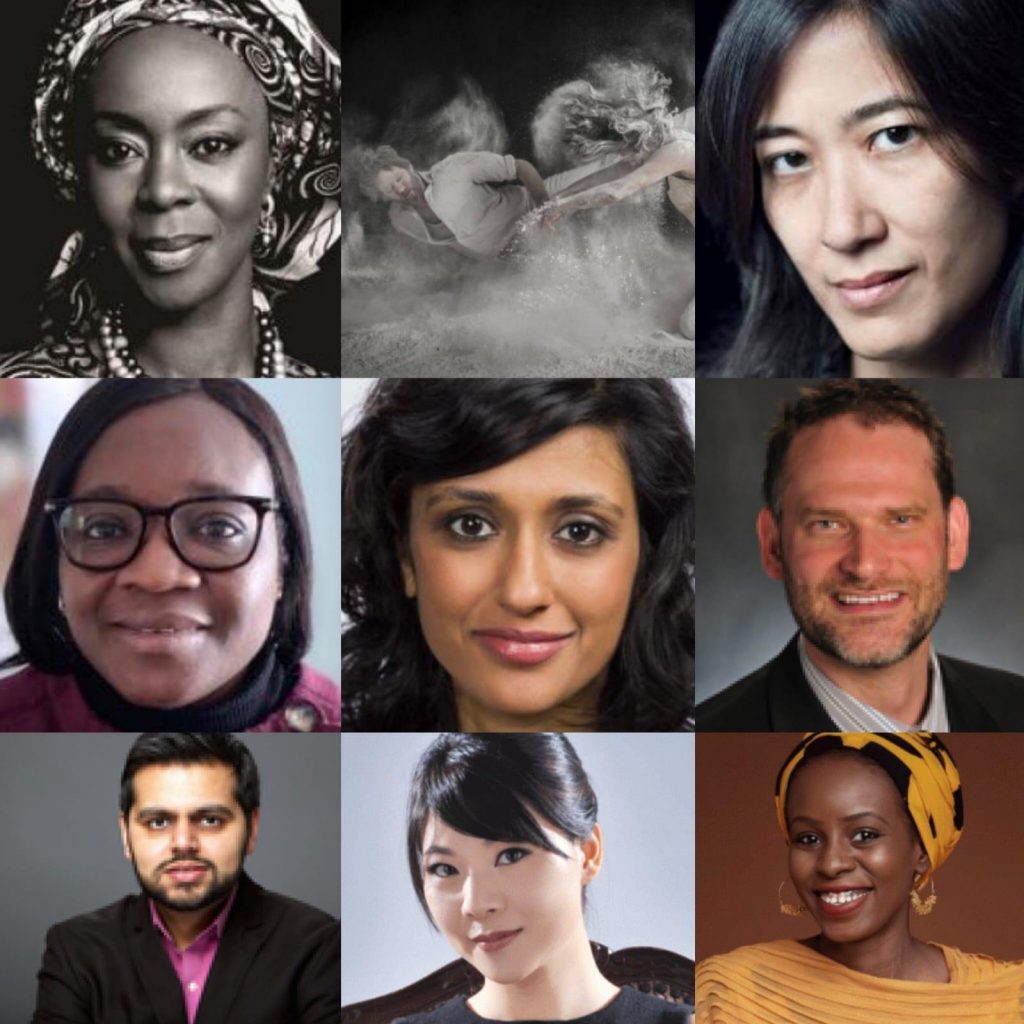
In addition to Mrs Saraki’s keynote speech, presentations will also be made by global health leaders and innovators, including:
– Leah Borromeo, creator of the Climate Symphony, which turns data on climate change into musical composition
– Andrew Zolli, head of global impact initiatives at Planet, a breakthrough space and AI organization that has deployed the largest constellation of Earth-observing satellites in history.
– Githinji Gitahi, CEO of Amref Health Africa, who will be speaking about rights-based universal health coverage in Africa.
– Tine Knott, vice president of the Center for Secure and Stable States at DAI, who designs programs to counter violent extremism and build peace and security.
– Hawa Talla, a chief of party for IntraHealth in Senegal, who pioneers efforts to expand new contraceptive technologies in West Africa and new ways to get African city mayors involved in family planning.
– Serge Attukwei Clottey, an artist known for Afrogallonism, a concept that explores the relationship between material objects—such the ubiquitous yellow, gallon-size oil container—in relation to consumption and necessity in the lives of modern Africans.
Representatives from The Bill & Melinda Gates Foundation, the World Bank, Harvard and Duke Universities, Pfizer and the US Agency for International Development, among many others, will also be in attendance this year.